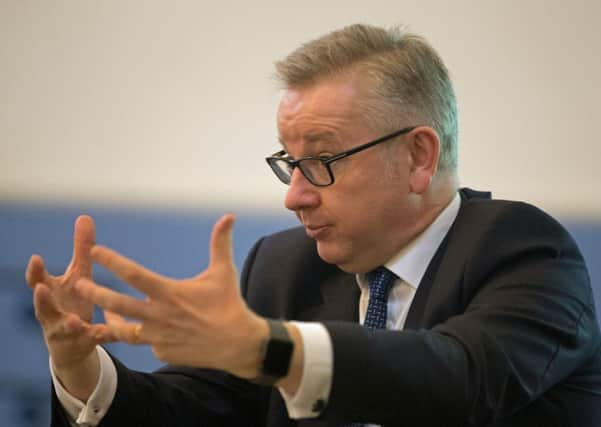Farm subsidies could remain for five years after Brexit


But after 2024, farmers will be paid on the basis of “public money for public goods”, he said, as the current EU system of paying landowners for the amount of agricultural land they have is “unjust, inefficient and drives perverse outcomes”.
Speaking at the Oxford Farming Conference, Mr Gove said the existing farm support system through the Common Agricultural Policy gives the most from the public purse to those who have the most private wealth, bids up land prices, rewards farmers for inefficient methods of production and fails to incentivise truly ecologically healthy landscapes.
Advertisement
Hide AdAdvertisement
Hide Ad“We can, and must, do better,” he said, before going on to explain that he wants to introduce changes in a way which would avoid farmers facing a “cliff edge” and which builds thoughts about “natural capital” - the value nature provides to society - into a sustainable approach for the future of the countryside.
Mr Gove promised a Command Paper will be published this spring to give more details about the Government’s plans and said: “Building on previous countryside stewardship and agri-environment schemes, we will design a scheme accessible to almost any land owner or manager who wishes to enhance the natural environment by planting woodland, providing new habitats for wildlife, increasing biodiversity, contributing to improved water quality and returning cultivated land to wildflower meadows or other more natural states.”
The Government has already guaranteed to match the annual £3bn subsidies paid to farmers up until 2022 and Mr Gove elaborated further at the conference, saying: “I then envisage guaranteeing that BPS payments (direct Basic Payment Scheme subsidies) continue for a transition period in England, which should last a number of years beyond the implementation period, depending on consultation.”
He added: “During these years, we propose to first reduce the largest BPS payments in England. We could do this through a straight cap at a maximum level or through a sliding scale of reductions, to the largest payments first.
Advertisement
Hide AdAdvertisement
Hide Ad“This should provide every existing farmer who receives a BPS payment with a guaranteed income over this extended transition period.
“That guaranteed income should provide time for farmers to change their business model if necessary, help to make the investment necessary for any adjustments and prepare for the future.
“And, after that transition, we will replace BPS with a system of public money for public goods.”
The president of the National Farmers’ Union Meurig Raymond said Mr Gove’s speech was a “positive signal for the farming industry” and that with adequate time to prepare, the introduction of a new policy framework for farming could be delivered successfully.
Advertisement
Hide AdAdvertisement
Hide AdChristopher Price, director of policy at the Country Land and Business Association, said he was pleased that Mr Gove had proposed to extend the period of operation of the existing basic payment scheme to ensure a full and smooth transition.